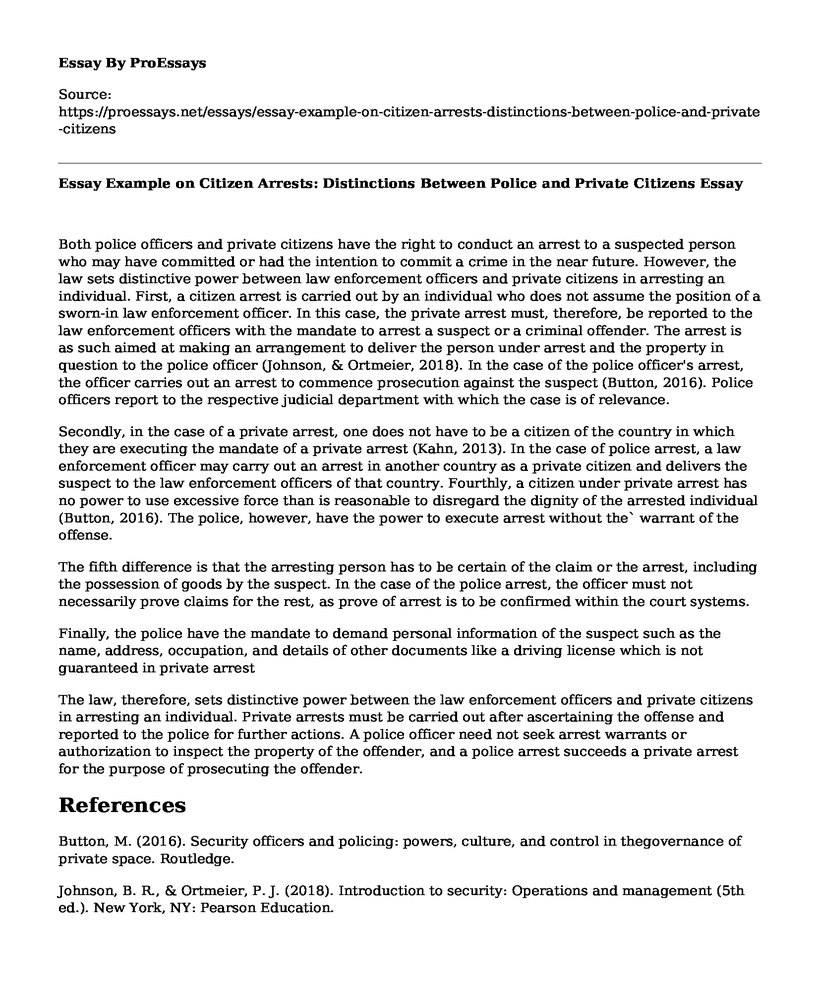Both police officers and private citizens have the right to conduct an arrest to a suspected person who may have committed or had the intention to commit a crime in the near future. However, the law sets distinctive power between law enforcement officers and private citizens in arresting an individual. First, a citizen arrest is carried out by an individual who does not assume the position of a sworn-in law enforcement officer. In this case, the private arrest must, therefore, be reported to the law enforcement officers with the mandate to arrest a suspect or a criminal offender. The arrest is as such aimed at making an arrangement to deliver the person under arrest and the property in question to the police officer (Johnson, & Ortmeier, 2018). In the case of the police officer's arrest, the officer carries out an arrest to commence prosecution against the suspect (Button, 2016). Police officers report to the respective judicial department with which the case is of relevance.
Secondly, in the case of a private arrest, one does not have to be a citizen of the country in which they are executing the mandate of a private arrest (Kahn, 2013). In the case of police arrest, a law enforcement officer may carry out an arrest in another country as a private citizen and delivers the suspect to the law enforcement officers of that country. Fourthly, a citizen under private arrest has no power to use excessive force than is reasonable to disregard the dignity of the arrested individual (Button, 2016). The police, however, have the power to execute arrest without the` warrant of the offense.
The fifth difference is that the arresting person has to be certain of the claim or the arrest, including the possession of goods by the suspect. In the case of the police arrest, the officer must not necessarily prove claims for the rest, as prove of arrest is to be confirmed within the court systems.
Finally, the police have the mandate to demand personal information of the suspect such as the name, address, occupation, and details of other documents like a driving license which is not guaranteed in private arrest
The law, therefore, sets distinctive power between the law enforcement officers and private citizens in arresting an individual. Private arrests must be carried out after ascertaining the offense and reported to the police for further actions. A police officer need not seek arrest warrants or authorization to inspect the property of the offender, and a police arrest succeeds a private arrest for the purpose of prosecuting the offender.
References
Button, M. (2016). Security officers and policing: powers, culture, and control in thegovernance of private space. Routledge.
Johnson, B. R., & Ortmeier, P. J. (2018). Introduction to security: Operations and management (5th ed.). New York, NY: Pearson Education.
Kahn, J. (2013). Building Brics: Human Rights in Today's Emerging Economic Powers; Freedom of Expression in Post-Soviet Russia. UCLA J. Int'l L. Foreign Aff., 18, 1.
Cite this page
Essay Example on Citizen Arrests: Distinctions Between Police and Private Citizens. (2023, Mar 26). Retrieved from https://proessays.net/essays/essay-example-on-citizen-arrests-distinctions-between-police-and-private-citizens
If you are the original author of this essay and no longer wish to have it published on the ProEssays website, please click below to request its removal:
- Paper Example on Transport Industry: An Understanding of the Industry and What I Have Learned
- Ethical Conducts Essay Example
- Cook County Fire and Cocoanut Grove Nightclub Fire Paper Example
- Firefighters Thrice More Prone to Cancer: Research Paper
- Car Sales & Interest Rates: Factors Affecting Vehicle Transactions - Essay Sample
- Essay Example on Data Center Facility Risks: Power, Fire & More
- Pacific Railway Act Signed into Law: Transcontinental Railroad Construction Funded - Essay Sample







